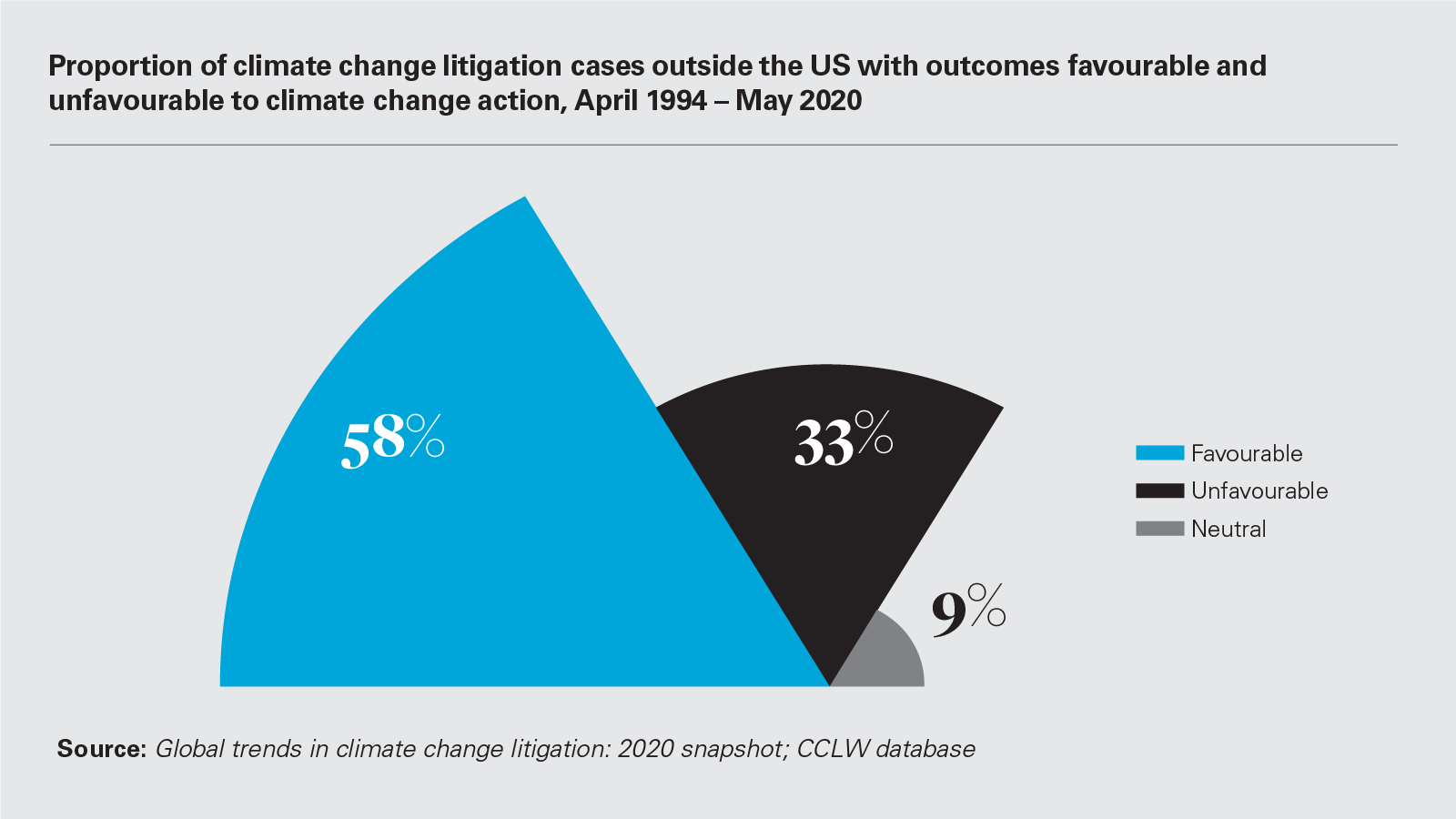
Climate change disputes: Sustainability demands fuelling legal risk
Businesses must be prepared for legal challenges to their activities and proactively take steps to limit their exposure to climate change-related claims
21 min read
World in Transition
Our views on changing dynamics in energy, ESG, finance, globalization and US policy.
The authors would like to thank Katherine Daley, Karthik Nagarajan, Alvaro Peralta, Gwen Wackwitz, and Daisy Wetherill for their contributions to this report.
Climate change-related disputes are no longer a niche for academic arguments. Companies, governments and industries are now facing unexpected judgments with serious implications on business operations as courts continue to expand their role in facilitating regulatory change. Even as the global economy grapples with the effects of COVID-19, the urgency of addressing climate change remains.
Climate change-related disputes have evolved beyond damages-based claims to a new and diverse class of climate change-related actions. In the past two years alone, some 600 new cases have been filed.
2,086
Number of climate laws and policies
around the world as of December 2020Source: LSE, Grantham Research Institute on Climate Change and the Environment
The increase in climate change-related actions has amplified pressure on legislators, regulators and legal institutions alike to facilitate the prosecution of such actions, and many regulatory authorities have responded with procedural developments designed to foster the pragmatic use of legal remedies. These legal and procedural developments have contributed to a new environment in which climate change-related disputes are more prevalent than ever.
In February 2020, the International Bar Association also published a 'Model Statute' recommending changes to procedural and evidential rules for litigation against governments for failing to act on climate change. This is designed to assist claimants bringing claims by waiving the need to provide security for costs, and the Model Statute even provides for unsuccessful claimants to be reimbursed for their costs in 'upholding or advancing an important public interest issue or the law relating to climate change, the environment or human rights'.
Arbitration has been gaining recognition as a potential forum for the resolution of disputes related to climate change and, in January 2020, the ICC Task Force on the Arbitration of Climate Change Related Disputes noted the benefits of procedural features such as responsiveness of tribunals and the specific expertise of selected tribunal members as supporting the role of arbitration in this regard.
Alongside these developments, there are new voluntary rules and guidelines on how to manage the risk of climate change issues also being developed, highlighting the increasing attention that climate change is attracting in the context of corporate governance. In June 2020, the Climate Financial Risk Forum published guidance for financial services firms on how to approach and address climate-related financial risks, and highlighting how, if poorly managed, the physical risks of climate change and the transition risks of moving to a net-zero carbon economy could lead to a financial crisis. Additionally, in November 2020, the European Central Bank (ECB) published its guidance on climate-related risks, noting that it will now ask banks to voluntarily conduct a self-assessment and produce an action plan in line with the ECB's guidance. The ECB intends to benchmark and challenge these plans in an effort to stimulate further climate-related risk analysis and disclosure in the financial sector.
Climate change-related disputes are no longer a niche for academic arguments; companies, governments and
industries are now facing unexpected judgments with serious implications
Legal developments
As regards claims for damages, the law of causation remains a key hurdle for many climate change-related claims: The complexity of the energy sector, supply chains and consumer choices all create numerous breaks in the chain of causation, making it difficult to attribute climate change to the actions of one or even multiple companies or governments.
However, developments in the law of causation regarding an issue of similar public importance indicates an increased willingness of the judiciary to develop the law to enable claimants to overcome this hurdle. In Oklahoma v. Johnson & Johnson, concerning the cost burden on the state allegedly resulting from the use of opioids, the court rejected Johnson & Johnson's arguments that the link between the behaviour of which it was accused (the manufacture, marketing and sale of opioids) and the strain on Oklahoma's public health, was too remote to establish causation.
Instead, the court accepted an expansive definition of nuisance, holding that Johnson & Johnson created a public nuisance by engaging in a marketing campaign promoting opioid use. Were this decision to be applied in a climate change-related dispute, the effect would be that, rather than having to establish, for example, that marketing material which promotes the use of fossil fuels contributed to the 'primary' nuisance of climate change, claimants would only have to meet a lower threshold of establishing that the marketing itself is a public nuisance. Such developments in the law of causation would help circumvent the significant challenge that claimants have previously faced in establishing causation in climate change disputes.
412
Number of climate litigation cases
around the world as of December 2020Source: LSE, Grantham Research Institute on
Climate Change and the Environment
Climate damage claims in the US
In the US, federal and state regulators, municipalities, private plaintiffs (such as shareholders) and environmental activists continue to bring claims against energy companies in connection with alleged injuries resulting from climate change, with the number substantially increasing in the past couple of years. Politically motivated plaintiffs are pursuing claims based on innovative legal theories, increasingly focussed on jurisdictions that may be more sympathetic to the position of plaintiffs from the local communities where the alleged harms have occurred.
Federal courts, typically preferred by defendant companies, are increasingly deciding that claims based on state law should be resolved in local state courts. US climate change-related claims are also becoming more sophisticated, often encompassing multiple causes of action beyond state law tort claims. Claims may include tort law or public trust doctrine actions (concerning climate physical or damage), state and federal securities and consumer protection law claims (concerning the adequacy of climate change disclosures or allegations of deceiving customers about climate change-related risks), and citizen suits brought under federal environmental statutes (concerning alleged failure to prepare assets for climate change impacts). Several US states and municipal authorities (including authorities from California, Colorado, Delaware, New Jersey, Rhode Island, South Carolina, Washington State and Maryland) have commenced proceedings against energy companies, seeking compensation for the alleged injuries caused to local communities owing to climate change. In September 2020, the City of Hoboken, New Jersey sued energy companies and the American Petroleum Institute for public and private nuisance, trespass, negligence and violations of New Jersey's Consumer Fraud Act, seeking alleged damages inflicted upon the city through the impacts of climate change.
58%
of non-US cases from May 2019 to May 2020
had favourable outcomes to climate change actionSource: LSE, Grantham Research Institute
on Climate Change and the Environment
Moreover, US regulators are increasingly filing claims or investigating energy companies under federal and state securities and consumer protection laws. Environmental group plaintiffs have also filed 'failure to adapt' cases against energy companies, alleging that the companies violated federal environmental statutes and waste management laws (such as the Resource Conservation and Recovery Act and Clean Water Act) by failing to prepare their assets for the foreseeable impacts of climate change.
Claimants nevertheless continue to encounter difficulties prosecuting their claims in the US courts, which have frequently dismissed or stayed climate change-related cases pending administrative determinations from environmental regulators (as was seen in the United States District Court for the District of Massachusetts March 21, 2020 order in Conservation Law Foundation, Inc. v. ExxonMobil Corp. et al.). Courts have often determined that they are not the proper venue for such disputes because they concerned political issues, the claims had been pre-empted or displaced by federal statute or the issues were more appropriate for consideration by an environmental regulator. For example, in January 2020, a federal appeals court instructed a federal district court to dismiss claims brought by 21 youths against the federal government for violating their rights to a safe climate, in Juliana v US, when the Ninth Circuit Court of Appeal 'reluctantly' ruled that the appropriate audience for the appellants' climate-related petitions was the executive or legislative branch (or the electorate at large).
However, in a development that is likely to embolden claimants, as has been seen in San Mateo et al. v. Chevron et al. and Massachusetts v. Exxon Mobil, US federal courts have been inclined to rule that climate change-related disputes should be decided in local state courts, pursuant to the relevant state law, rather than in federal court. This is based on the finding, as highlighted in Oakland, et al. v. BP PLC et al., that climate change-related state law nuisance claims are not protected by federal law because they do not require resolution of a question of federal law or an interpretation of federal statute.
197
signatories to the Paris Agreement
The US Supreme Court has yet to determine whether there is federal common law applicable to climate change disputes. Energy company defendants that have been unsuccessful in removing climate cases to federal court are currently seeking Supreme Court adjudication on a federal appellate court's scope of review of remand orders. In September 2020, the US Supreme Court agreed to review the decision in Baltimore v. BP, et al. to examine the issue.
Given the political support for claimant-driven climate litigation, these decisions may encourage other cities and states to issue climate change lawsuits. Until the Supreme Court determines one of the pending climate change cases, procedural disputes regarding the proper jurisdiction will continue.
Video: Climate change litigation: A global snapshot
View a PDF of 'Climate change litigation: A global snapshot'
European activism
Europe is also witnessing a rising number of claims against energy companies for climate damage with varying approaches among jurisdictions. Unlike the US, these claims typically seek to impose obligations on governments and energy companies rather than compensation for alleged climate-related damage.
In the Netherlands, following the landmark ruling by the Dutch Supreme Court in Urgenda v. Netherlands, climate change-related claims continue to be largely rights-based. In December 2019, the Dutch Supreme Court upheld the 2015 decision of the District Court of The Hague, which ruled that the Dutch government must reduce its greenhouse gas emissions by at least 25 per cent by 2020. Urgenda successfully argued that, by failing to do so, the Dutch government had acted unlawfully in contravention of its duty of care under Articles 2 (Right to life) and 8 (Right to respect for private and family life) of the European Convention on Human Rights. This was the first decision by any court in the world ordering a state to limit its greenhouse gas emissions for reasons other than statutory mandates, and has provided stimulus for further claims of this nature.
2050
Net-zero target for global emissions
The ruling, first made by the District Court of The Hague in 2015, has been a trigger for other claims. For example, in Milieudefensie v. Royal Dutch Shell, a group of nongovernmental organisations and more than 17,000 Dutch citizens are seeking to extend this established duty of care to private corporations. If successful, energy companies would also have a duty of care to take action to reduce their greenhouse gas emissions.
France has also seen an increase in climate change-related disputes, following the introduction of the 2017 Corporate Duty of Vigilance law. This legislation applies to large national and multinational corporations and imposes an obligation on them to identify and prevent risks to human rights and the environment that could occur as a result of their business practices. In 2019, the nongovernmental organisation Friends of the Earth used the obligations imposed by this legislation to bring claims against energy company Total. As with the rights-based claims in the Netherlands, these claims seek to oblige companies properly to assess their impact on the environment and to act in a way where climate damage is limited. Similar claims have also been brought in Poland.
In Europe, Lliuya v. RWE AG, which was commenced in Germany in 2015, remains the exception to this approach. In this case, the claimant, a Peruvian farmer, alleged that RWE, having knowingly contributed to climate change by emitting substantial volumes of greenhouse gases, bore some measure of responsibility for the melting of mountain glaciers near the claimant's home town of Huaraz, Peru, which has given rise to an acute threat of flooding and mudslides. Recognising that RWE could only be a contributor to the emissions responsible for climate change, the claimant requested RWE pay 0.47 per cent of the costs that the Huaraz authorities expect to incur for the installation of flood protection (which percentage is said to correlate to RWE's alleged contribution to the greenhouse gas emissions).
The claim was initially dismissed on the basis that there was no clear causal link between RWE and the alleged damage. However, in November 2017, the appeals court held that the claim was admissible, thereby determining for the first time that a private company could, in principle, be liable for its share in causing climate change-related damage to private property. If the German courts find in favour of the claimant, the scope of liability for large greenhouse gas emitters will change dramatically.
Global trends
In other jurisdictions, where disputes related to climate change are less common, claimants have also increasingly applied a rights-based approach to establish their claims for climate change-related harms. A three-year investigation by the Commission on Human Rights of the Philippines concluded that 47 major fossil fuel companies should be accountable for the human rights harms caused to Filipino citizens due to climate change. The Commission concluded that the existing laws of the Philippines provide both civil and criminal grounds for action against these companies, suggesting future legal action is very likely.
Actions against climate change—both through the courts and other mechanisms—will only increase in number and sophistication in the future
Similar claims have started elsewhere. In South Korea, for instance, in Do-Hyun Kim et al. v. South Korea, young activists recently filed a constitutional law claim against the government alleging that the nation's climate law violates their fundamental rights, including their right to life and their right to a clean environment.
Moreover, some claimants have even sought to establish rights in the environment itself. A recent class action lawsuit filed in the Argentinian Supreme Court, Asociación Civil por la Justicia Ambiental v. Province of Entre Ríos, et al., alleges that various municipalities have failed to protect the environmentally sensitive wetlands of Parana Delta, seeking a declaration that it is a 'subject of rights' itself. The claimants seek to rely on the Argentinian constitution, as well as the Paris Agreement, the UNFCCC and the Convention on the Rights of the Child.
The reliance on international law is common in claims outside of Europe and the US, where legal systems often do not provide claimants with an obvious cause of action. Fuelled by the success of Urgenda, similar proceedings have been brought on a global scale. In September 2019, Sacchi et al. v. Argentina et al., 16 children filed a petition against Argentina, Brazil, France, Germany and Turkey, claiming their rights under the UN Convention on the Rights of the Child had been violated.
The claimants accuse the named governments of failing to make sufficient cuts to greenhouse gases, and failing to encourage the world's largest emitters to curb carbon pollution. The children request that the UN Committee on the Rights of the Child declare that climate change is a children's rights crisis, and that each respondent has caused and is perpetuating climate change by knowingly acting in disregard of available scientific evidence. The claimants also ask the Committee to make recommendations to the governments in order to address the climate crisis.
In a case brought before the High Court in New Zealand, Smith v. Fronterra Co-Operative Group Limited, an individual of indigenous descent claimed customary interests in land and other resources situated in or around Mahinepua, noting that various sites of customary, cultural, historical, nutritional and spiritual significance to him are close to the coast or on low-lying land. As such, the claimant commenced legal proceedings against several defendants that operate facilities that emit greenhouse gases in the specified area, including dairy farms, a power station and an oil refinery. The claimant alleged that the defendants' contributions to climate change constitute: (i) a public nuisance; (ii) negligence; and (ii) a breach of a duty recognised at law to cease contributing to climate change. In March 2020, the Court rejected the public nuisance and negligence claims, and, whilst it allowed the novel tortious duty of care claim to proceed, it observed that matters of public policy meant the claim would face significant hurdles. This decision nevertheless signals an evolution of the common law with respect to the justiciability of climate change-related claims.
Impact on infrastructure
Interaction between planning law and climate change is intensifying, as jurisdictions set new targets related to climate change mitigation which directly impact planning controls.
In December 2019, the EU heads of state and government committed to carbon neutrality by 2050, with a primary objective to achieve EUwide net-zero emissions by 2050. As part of this commitment, the European Commission presented a draft European Climate Law on 4 March 2020, providing for 'the need to integrate climate change-related risks into investing and planning decisions'.
40+
ongoing climate cases worldwide
against carbon majors as of July 2020Source: LSE, Grantham Research Institute
on Climate Change and the Environment
Some jurisdictions already include references to climate change in their planning legislation. In the UK, there is a legal duty under the Planning and Compulsory Purchase Act 2004 providing that climate change mitigation and adaptation must be core objectives to integrate across all local planning policy. Climate change considerations have therefore become relevant at all stages of a planning process and, increasingly, are a material factor in the decisions of public bodies as to whether to approve or refuse applications for planning permission.
Public interest considerations also play a prominent role in deciding planning applications that present climate change risks, with courts having to balance such risks with the potential benefits to the public that would result from the relevant development.
In the recent landmark Australian ruling of Gloucester Resources Limited v. Minister for Planning, the Land & Environment Court of New South Wales upheld a denial of a company's application to construct a coal mine. The Court found that the project was not in the public interest, as the Environmental Planning & Assessment Act required the government to consider public interest in its review of a development application. The Court held that the Planning Department should have considered the amount of greenhouse gas emissions caused by the project and ecologically sustainable development factors. The Court ultimately ruled that the negative effects of the project, and particularly its climate change impact, outweighed economic and other public benefits.
In EarthLife Africa Johannesburg v. Minister of Environmental Affairs and Others, South Africa's High Court made a similar decision, holding that climate change is a relevant factor in environmental planning and that the environmental review of a coal-fired power plant was unlawful because it failed adequately to consider climate change-related impacts.
However, in a recent British case, R (on the application of ClientEarth) v. Secretary of State for Business, Energy and Industrial Strategy, the High Court took the opposite stance. Here, ClientEarth challenged the Secretary of State's decision to approve a planning application to install new gas turbines at a power station, arguing that it posed a significant threat to the UK's target of achieving net-zero carbon by 2050, which is legally binding under the Climate Change Act 2008. Despite the Planning Inspectorate being supportive of ClientEarth's position, the Court held that other "public interest issues in favour of such development" outweighed the environmental targets, confirming that policy-making in this area of law involves "the striking of a balance in which these and many other issues are assessed and weighed".
These cases illustrate the difficult balancing act facing the courts and planning authorities when it comes to public interest considerations.
Nevertheless, the trajectory is clear. The growth in the number of climate change-related disputes suggests that where a potential development presents climate change risk, these will increasingly be found to outweigh the potential benefits of the development and are now cited by the courts and planning authorities as a reason for refusing planning permission.
Failing to disclose climate risk
Shareholders and activists are also seeking legal redress over inadequate or allegedly fraudulent disclosure of climate related risks in financial and strategic reporting. In the high-profile case of NYAG v Exxon Mobil, the New York Attorney General alleged that Exxon had engaged in a "longstanding fraudulent scheme" to deceive investors by providing misleading statements that Exxon was effectively managing risks posed by climate change regulations, and that such regulations did not pose a significant risk to the company.
NYAG asserted that Exxon's internal practices were inconsistent with its external statements, were undisclosed to investors and exposed the company to greater risk from climate change regulation than investors were led to believe. Exxon defended itself against the allegations, maintaining that it had made accurate disclosures, and a New York State Supreme Court judge concluded that NYAG failed to prove that Exxon had misled shareholders.
Spurred by the devastating Australian bush fires in 2020, in O'Donnell v. Australia, a group of investors filed a class action alleging that the Australian government had failed to disclose the material risks from climate change in its government bonds. The relief sought by claimants specifically includes a declaration that the Australian government breached its duty of disclosure by misleading investors, and an injunction restraining the government from further promoting bonds until the disclosure adequately reflects the risks. Similarly, in McVeigh v. Retail Employees Superannuation Fund, an individual investor brought a claim against an Australian pension fund, alleging that the fund is violating the law by failing to provide information related to how the pension trustees manage climate risks in the fund.
Relatedly, claimants are also pursuing companies on the basis that they have exaggerated or over-emphasised their renewable energy and/or climate change credentials—a term known as 'greenwashing'. In December 2019, ClientEarth submitted an Organisation for Economic Co- Operation and Development (OECD) complaint against BP alleging that its 'Possibilities Everywhere' advertising campaign did not constitute 'clear, honest or accurate' public communication regarding its renewable credentials.
BP subsequently withdrew the campaign but, in June 2020, it was announced that, had BP not committed to do so, the complaint would have proceeded on the basis that the OECD had assessed the complaint as material and substantiated. This decision has undoubtedly created a precedent with respect to future adverts concerning fossil fuels, with commentators noting the parallels with the claims brought against tobacco manufacturers in the past, which led to the introduction of mandatory health warnings on all tobacco products.
The introduction of stricter regulatory regimes on financial disclosure and voluntary guidance on this issue is evidently fuelling legal risk for companies. Companies should therefore be alert to heightened scrutiny from shareholders, government officials and the public over how they present, disclose and internally account for climate change-related risks.
Shareholder action
The rising sense of urgency has also prompted shareholders to take action against climate change through traditional business mechanisms, such as voting on climate change resolutions at annual meetings.
This strategy has been deployed by activist shareholder groups such as Climate Action 100+, a group of investors who have signed a voluntary statement setting out their commitments and the expectations of various companies on the initiative's focus list, including large energy companies. One example of this group's influence is Shell's 2018 public commitment to set short-term targets to reduce its carbon footprint, after concerted pressure from the Church of England and Robeco, which lobbied Shell on behalf of Climate Action 100+.
This initiative has now expanded well beyond the known activist groups, as companies face increased scrutiny from their shareholders for their environmental impact. Notably, the increased demand from shareholders for sustainability comes in spite of the economic ramifications of COVID-19, as investors have become increasingly aware of the risk climate change poses to the value of their assets.
Significant resolutions are being tabled for consideration, many of which have been passed. Shareholders are voting in favour of setting climate targets in line with the Paris Agreement.
As a result, 2020 has proven to be a landmark year for investor action on climate change, with significant resolutions being tabled for consideration, many of which were passed. For example, shareholders at a number of financial and energy companies have voted in favour of setting climate targets in line with the Paris Agreement. While not all resolutions have obtained the required majority, the influence that can be exerted by shareholders should not be underestimated, as it has been revealed that some shareholders are now also opting to vote against the re-election of directors of companies whose views do not align with their own.
As this turbulent period of uncertainty continues, it is clear that it has seen many more groups and individuals take action against climate change, both through the courts and other mechanisms, and it is expected that these actions will only increase in number and sophistication. While challenges remain in the prosecution of these claims, legislators, regulators and legal institutions are taking steps to assist claimants in this regard. Similarly, courts are beginning to make positive rulings in favour of claimants. In this evolving landscape, companies and financial institutions must be prepared for legal challenges to their business activities and proactively take steps to limit their exposure to climate change-related claims.
White & Case means the international legal practice comprising White & Case LLP, a New York State registered limited liability partnership, White & Case LLP, a limited liability partnership incorporated under English law and all other affiliated partnerships, companies and entities.
This article is prepared for the general information of interested persons. It is not, and does not attempt to be, comprehensive in nature. Due to the general nature of its content, it should not be regarded as legal advice.
© 2021 White & Case LLP

 View full image of 'Proportion of climate change litigation cases outside the US' (PDF)
View full image of 'Proportion of climate change litigation cases outside the US' (PDF)



